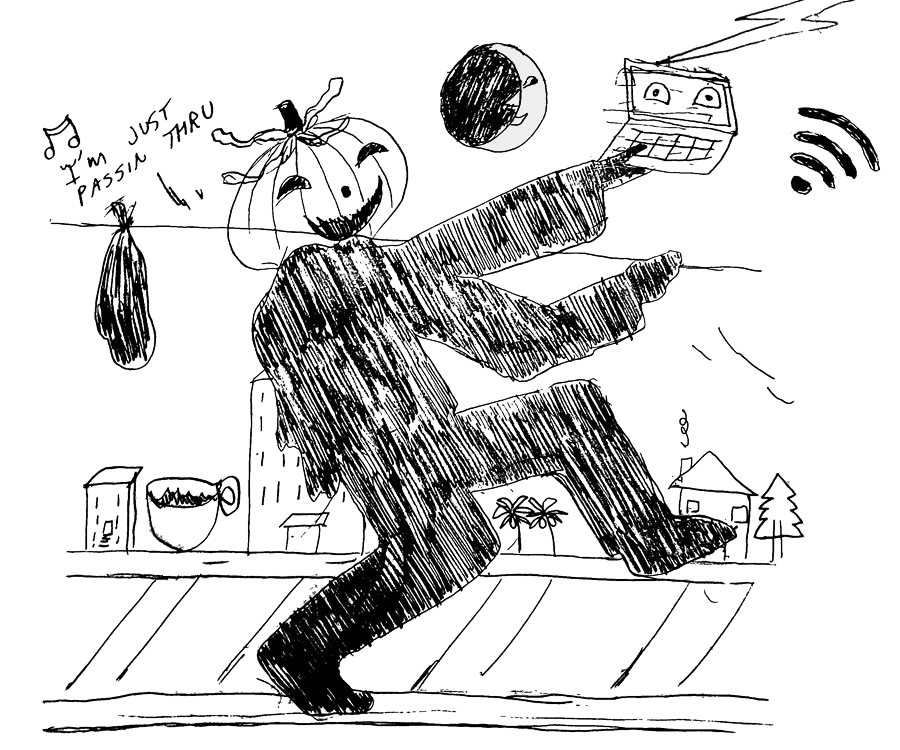Tom Bubul .info
tombubul@gmail, @tombubul. Initial post 8/5/2019, last modified .
Wireless Access Point Guide

I think I'd describe the "folk internet" generally at this point as everything happening online that isn't directly facing or occurring on a platform the user has no ownership stake in, and is 100% unconcerned about its own analytics - stuff for its own sake. I've been thinking about how this quadrant of internet stuff relates to irl folk cultures, especially the one surrounding freight trains in America.
If you're trying to get online, how that works in at least one sense isn't extremely dissimilar from trying to catch a ride on a train. If you already know what you're doing, you can figure it out via typical means almost wherever you are. Alternatively, you can ask a local authority for assistance. Around trains, a local can make your wait safer and more fun by showing you the relaxing, hidden jungle, not just the one all the characters hang out at that's covered in trash. With getting online, a local can do the same by giving you a password to a network where you'll enjoy a connection that's likely faster and less-compromised (by e.g. site blockers, timers, or slow speeds). Both of these information exchanges relate to your network, are fundamentally local to where you are, and are more or less transitory; it only matters if you know someone with a wifi password or tips on the best catch-out spot in Philly while you're there. In both cases, as you travel, you accumulate knowledge of good spots.
The train-riding world has a samizdat that collects this information, called "the crew change guide," originally attributed circa the late 1980s to "the Train Doctor," but now a collaborative effort. It's a dense document of useful (and arcane, indecipherable, out-of-date, incomplete, etc.) information relevant to accessing and riding trains (such as when and where their crews typically change) out of what appears to be a serious percentage of the working rail yards in North America.
Formally and traditionally speaking, the crew change guide is designed and intended to be distributed directly between train riders, and only at the cost of the photocopies. While train riders are as online as anyone in 2019, posting the crew change guide is still aggressively discouraged - the idea is to keep the info within a trusted network of riders who are already capable of riding, and thus not at risk of using the guide inappropriately or dangerously, plus out of the hands of narcs (ostensibly because they would read their yard's entry in the guide and change tactics).
One aspect of the folk internet people seem to be as engaged with as ever is the matter of home wifi network names and their passwords - the rare passwords that are spoken to other people, saved by other people, and generally not changed. As a format or mode of expression (or even as a quality of home decor) network name/pass pairs are fun to interact with and they can tell you a lot about where you are. This isn't super different to me from train monikers - drawing a little character and writing a little tagline on a train. Then maybe someone sees it again, years later, in some other city; especially if they recognize it they might grin.
Triangulating these things, I thought it would be fun and useful to create an offline-only living document of private wireless access points and their passwords - to read through a long list of fun name/pass/location combos, or to use while traveling to get online. After a period of collecting data, I intend to make the printed wireless access point guide available at cost to anyone in my trusted network, and to encourage that network to distribute further accordingly. None of this info will ever be printed online.
Contributor handles will be listed separately from networks at the front of the guide. Validation metadata questions (do I know you? how did you get here?) will not be printed; they are used here to validate trust. Assume all other info provided will be printed as-is. No version of the guide will ever be posted online.
This website is open daily from 8am-8pm in your local timezone. Top.